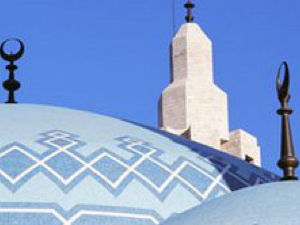
Edit OmarKN
-
Commendation By The Great Scholar Of Morocco,
The Diligent Hadith Scholar,
Prof. `Abdullah Guenon Al-Hasani,
President Of The Moroccan League Of Scholars
And Member Of The Islamic World League, Mecca

“They err in their understanding of the reality of intermediaries, and recklessly rush to the judgement that any intermediary is shirk ...”
From: Notions That Must Be Corrected
Shaykh Muhammad b. `Alawi al-Maliki al-Hasani, p.53ff
Satan, however was not satisfied except that he should again stir up this issue between the Muslims at a time when they most needed to be in agreement, putting aside conflict and standing up to those who showed enmity to their religion, as Allah (swt) commanded them with His word:
{ And fight the idolaters entirely, as they fight you entirely. } al-Tawba: 36
The discord of the Ash’ari vs. Salafī dispute over tenets of faith returned, and the Muslims were divided, accusing one another of heresy, or disbelief.
The Ash’ari school[1] was only established when anthropomorphism[2] took hold of the common people, and they no longer correctly understood Allah's transcendence. The school turned to figurative explanation (ta'wil) in order to rescue the creed.
Figurative[3] explanation is undeniably a permissible course to take, by evidence of the Qur’anic text:
{ It is He who has revealed unto you the Book, wherein are plain verses, which are the foundation of the Book; others are unclear. As for those in whose hearts is deviation: they seek out that which is unclear of it, seeking mischief, and seeking its explanation - yet none know its explanation save Allah, and those who are of sound knowledge. }
Al-’Imran: 6
Al-Ash’ari was one of those who possessed sound knowledge, as was Abu al-Ma`ālī al-Juwaynī, the Imam of the Two Sanctuaries, and Abu Hamid al-Ghazali, the Proof of Islam, and other great scholars of the Ash’ari school, which offered three distinct opinions regarding the allegorical[4] verses: Firstly, the way of the early Muslims (salaf), which was to believe what was indicated by the outward expression, while at the same time maintaining Allah’s transcendence and denying His having any likeness; secondly, figurative explanation according to lexical and metaphorical usage, which was the way of the later generation (khalaf); thirdly, the opinion to which al-Ash’ari himself leaned after having previously employed figurative explanation, which was to affirm that these allegorical phrases represented attributes of Allah (swt), the reality of which we cannot comprehend, but in which we believe as they are.
As we said, those who used figurative explanation did so out of a desire to protect the laity from erring in their understanding of allegorical phrases.
Footnotes
1: A defence of the Ash’ari school by Shaykh Sayyid Muhammad Alawi al-Maliki al-Makki, the author of “Notions That Must Be Corrected.” ↩
2: Anthropomorphism: the description of God in human terms, either with physical attributes or having human feelings ↩
3: figurative: non - literal; figures of speech such as metaphor, simile, and irony ↩
4: allegory | ˈalɪɡ(ə)ri | a story, poem, or picture that can be interpreted to reveal a hidden meaning, typically a moral or political one.
Also: a symbol.
+
allegorical | ˌalɪˈɡɒrɪk(ə)l | constituting or containing allegory. (Oxford Dictionary of English) ↩
صلّى الله على سيّدنا محمّد و على آله و صحبه و سلّم
The blessings and peace of Allah on the Prophet, his Family, and his Companions, ( sallAllahu `aleihi wa sallam ) .


Related texts
![]() The Intermediary of Shirk
The Intermediary of Shirk
Notions That Must Be Corrected; Shaykh Muhammad b. `Alawi al-Maliki al-Hasani
[download book]